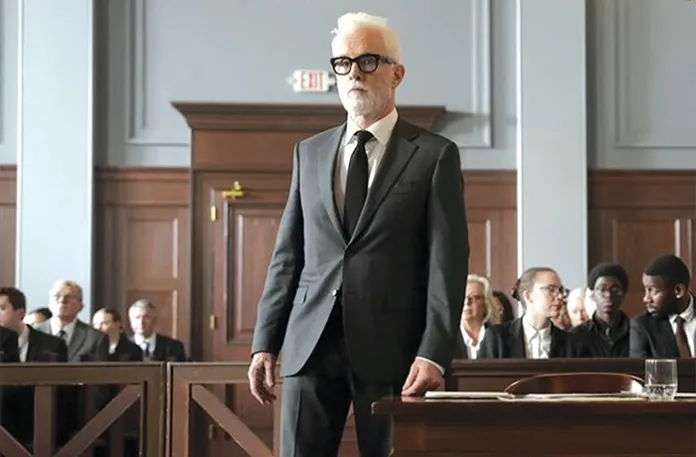John Grisham’s The Rainmaker started life as a novel (1995), became a film by Francis Ford Coppola (1997), and is now a television series on USA and Peacock. Somewhere, creative teams are readying a rock opera and a Saturday morning cartoon.
The new show is better described as an homage to the book and movie than as an adaptation of them. Familiar names pepper the script, but characters’ circumstances, identities, and motivations have been significantly altered. To be sure, creator Michael Seitzman, previously an executive producer on the network thrillers Code Black and Quantico, is under no obligation to retell the same story. Still, the show’s changes are instructive, as is usually the case when Hollywood types reveal what they think we want to see.
Grisham’s novel tells the story of Rudy Baylor, a fresh-out-of-law-school upstart who stumbles onto the case of a lifetime. Unable to secure employment with a white-shoe practice, the young man joins the law offices of “Bruiser” Stone, a hulking miscreant with the ethics of a card sharp. For 450 pages, Rudy learns to chase ambulances, falls in love, and serves his single important client, a bereaved mother whose son’s medical insurance claim was illegitimately denied. To the extent that the book has politics, they are pure Clintonian populism: Unless a champion intervenes, working-class Americans will get screwed by The Man every time.

USA’s series is up to something different. The new Rudy Baylor (Milo Callaghan) is no average Joe, but a top-of-his-class superstar with a massive ego. Fired from elite law firm Tinley Britt after an argument with his boss (John Slattery), Rudy barely pauses for breath before launching into righteous combat. The show’s litigant par excellence has been updated as well. Beneath Grisham’s pen, Dot Black was a blue-collar chain-smoker meant to stand in for all downtrodden Southern whites. Here, played by the black actress Karen Bryson, the character is all brains and sass. “A little tart,” she remarks of a glass of lemonade. “So am I.”
There is, of course, no harm in broadening a story’s “representation.” If a black Dot Black heals a wound or two, who am I to quibble with the decision? The problem comes when ideological casting choices begin to undermine the narrative, contravening Grisham’s famously effective structure and pacing. Case in point, the character of Bruiser Stone (Lana Parrilla), reimagined here as a buxom seductress with a heart of gold. Never mind that Coppola cast Mickey Rourke in the role — tough shoes to fill. It simply makes no sense, dramatically, that Rudy’s crooked taskmaster should also be an ardent defender of the dispossessed.
Other changes are even less thoughtful. Whereas the book’s and the movie’s antagonist is a cut-rate insurance house that denies a bone marrow transplant, the series’s big bad is a hospital guilty of wrongful death. At a glance, this makes a cynical kind of sense. The notion that black Americans receive inferior care has had renewed political purchase at least since the publication of a now-debunked 2020 study on black infant mortality. Yet, bizarrely, the TV show undercuts this angle by inventing a serial killer nurse from whole cloth, a move that shifts the blame away from systemic forces and toward a motiveless scoundrel. Throw in automobile stakeouts and several other hard-boiled flourishes, and one ends up with a different genre altogether: the courtroom thriller reborn as a half-woke, “true crime”-inflected dramedy.
Earlier this year, the literary magazine n+1 made a splash by exposing Netflix’s “casual-viewing” strategy, whereby characters “announce what they’re doing” onscreen so that even distracted audiences can follow along. That virus, I fear, is spreading. Note, for example, Rudy’s first introduction to Bruiser’s converted offices. First, the camera lingers on a fading “Taco Hut” sign. Next, a character remarks, “It used to be a Taco Hut.” Given the attention deficit of many of my fellow Americans, I suppose I shouldn’t be offended. Nevertheless, the moment is tough to swallow. Would any self-respecting show really risk insulting the viewer’s intelligence so flagrantly?
Indeed, The Rainmaker is perhaps most useful as a case study in the difference between prestige and “popular” television. An exchange between Rudy and his girlfriend, Sarah (Madison Iseman), provides a neat illustration of the point:
Sarah: “You know how my father says the flip side of everyone’s best quality is their worst quality?”
Rudy: “What’s my best quality?”
Sarah: “You never back away from a fight.”
Rudy: “What’s my worst quality?”
Sarah: “You never back away from a fight.”
There, in a single exchange, is nearly everything that is wrong with mass-market TV writing. In a good script, Sarah’s last answer would be replaced with silence, accompanied, if necessary, by a raised eyebrow. The Rainmaker, by contrast, simply doesn’t believe we’ll get the joke without help. “How stupid do they think we are?” my wife asked, watching alongside me in a state of increasing perplexity and dismay. Let’s not keep watching long enough to find out.
Graham Hillard is editor at the James G. Martin Center for Academic Renewal and a Washington Examiner magazine contributing writer.
